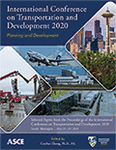International Conference on Transportation and Development 2020
Freeway Link-Level Travel Time and Reliability Thresholds
Publication: International Conference on Transportation and Development 2020
ABSTRACT
The average travel time (expected travel time), 95th percentile travel time (planning time), planning time index (PTI), and buffer time index (BTI) are being widely explored and used by practitioners and researchers, as performance measures in the field of transportation engineering. However, literature documents limited efforts on travel time and reliability thresholds for use in transportation planning and operational analysis. The focus of this paper is to examine the inter-relationships between currently used macroscopic parameters such as density, volume-to-capacity ratio (V/C), and speed with the selected travel time based performance measures to establish level-of-service (LOS) thresholds, from planning perspective, for freeway links. The city of Charlotte, North Carolina, USA, was used as the study area to gather data, perform the analysis, examine the inter-relationships, and establish the thresholds. The findings indicate that density and V/C, computed from a calibrated regional network model, are non-linearly related to the average travel time, 95th percentile travel time, PTI, and BTI. The threshold values for different LOS letter-grades, for all travel time based measures, vary based on whether density or V/C is used to establish the relationships. Therefore, the applicability of fewer LOS or reliability threshold categories (for example, reliable, moderately reliable, and unreliable) based on statistical parameters were explored for possible implementation.
Get full access to this article
View all available purchase options and get full access to this chapter.
REFERENCES
Allen, W. G. (2007). Metrolina Regional Travel Demand Model Technical Documentation. City of Charlotte Department of Transportation, North Carolina.
Bertini, R. L. (2005). Congestion and Its Extent In Access to Destinations: Rethinking the Transportation Future of Our Region. Levinson, D. and Krizek, K. eds., Elsevier Publications.
Caliper Corporation. (2004) Travel Demand Modeling with TransCAD 4.7. Newton, MA.
Charlotte Regional Transportation Planning Organization (CRTPO). (2017). <http://crtpo.org/PDFs/MTP/2040/Report/Ch10_Travel_Patterns.pdf>(Dec. 11, 2017).
Chen, C., Skabardonis, A. and Varaiya, P. (2003). “Travel-time reliability as a measure of service.” Transportation Research Record, 1855, 74-79.
Emam, E., and Al-Deek, H. (2006). “Using real-life dual-loop detector data to develop new methodology for estimating freeway travel time reliability.” Transportation Research Record, 1959, 140-150.
Federal Highway Administration (FHWA). (2017). Traffic Analysis Toolbox Volume VI: Definition, Interpretation, and Calculation of Traffic Analysis Tools Measures of Effectiveness. <http://ops.fhwa.dot.gov/publications/fhwahop08054/execsum.htm>(Dec. 11, 2017).
INRIX. (2013). I-95 VPP Interface Guide. <http://www.i95coalition.org/i95/Portals/0/Public_Files/uploaded/Vehicle-Probe/I-95%20VPP%20IF%20Guide%20v4%20February%202013%20%28Final%29.pdf>(Feb. 15, 2015).
INRIX. (2014). INRIX: Driving Intelligence. <http://www.inrix.com/>(Dec. 11, 2015).
Kittelson, W., and Vandehey, M. (2013). Incorporation of Travel Time Reliability into the HCM: the Strategic Highway Research Program 2 (SHRP2). Transportation Research Board of National Academies, Washington, DC.
Lomax, T., Turner, T., and Margiotta, R. (2004). Monitoring Urban Roadways in 2002: Using Archived Operations Data for Reliability and Mobility Measurement. Texas Transportation Institute, Texas A&M University, College Station, TX.
Lyman, K., and Bertini, R. L. (2008). “Using travel time reliability measures to improve regional transportation planning and operations.” Transportation Research Record, 2046, 1-10.
Pulugurtha, S. S., and Imran, M. S. (2017). “Modeling basic freeway section level-of-service based on travel time and reliability.” Case Studies on Transport Policy, https://doi.org/10.1016/j.cstp.2017.08.002.
Pulugurtha, S. S., Duddu, V. R., Puvvala, R., Thokala, V. R. and Shah, M. I. (2015). Commercial Remote Sensing & Spatial Information (CRS & SI) Technologies Program for Reliable Transportation Systems Planning: Volume 2 – Comparative Evaluation of Travel Time Related Performance Measures., Prepared for The United States Department of Transportation.
Shao, H., Lam, W. H. K., Meng, Q., and Tam, M. L. (2006). “Demand-driven traffic assignment problem based on travel time reliability.” Transportation Research Record 1985, 220-230.
Sisiopiku, V. P., and Islam, M. D. S. (2012). “A freeway travel time reliability study.” International J. of Engineering Research and Development, 2012, 3(10), 83-101.
Transportation Research Board (TRB). (2010). Highway Capacity Manual. TRB of National Academics, Washington, DC.
Wakabayashi, H., and Matsumoto, Y. (2012). “Comparative study on travel time reliability indexes for highway users and operators.” J. of Advanced Transportation, 46, 318-339.
Wolniak, M. J., and Mahapatra, S. (2014). “Data-and performance-based congestion management approach for Maryland highways.” Transportation Research Record, 2420, 23-32.
Information & Authors
Information
Published In
International Conference on Transportation and Development 2020
Pages: 119 - 132
Editor: Guohui Zhang, Ph.D., University of Hawaii
ISBN (Online): 978-0-7844-8316-9
Copyright
© 2020 American Society of Civil Engineers.
History
Published online: Aug 31, 2020
Published in print: Aug 31, 2020
Authors
Metrics & Citations
Metrics
Citations
Download citation
If you have the appropriate software installed, you can download article citation data to the citation manager of your choice. Simply select your manager software from the list below and click Download.
